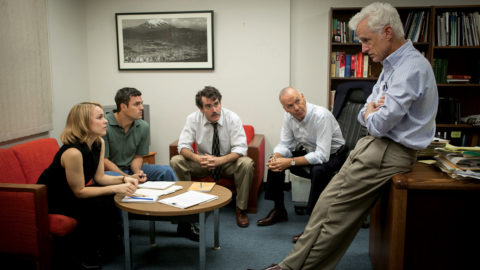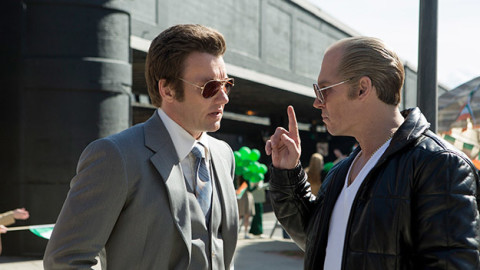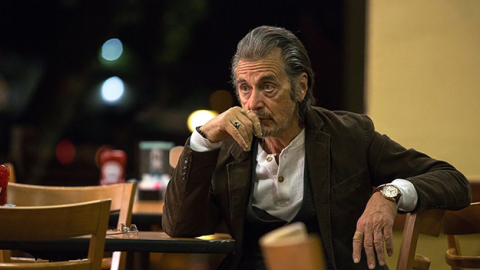Deep Focus: Spotlight
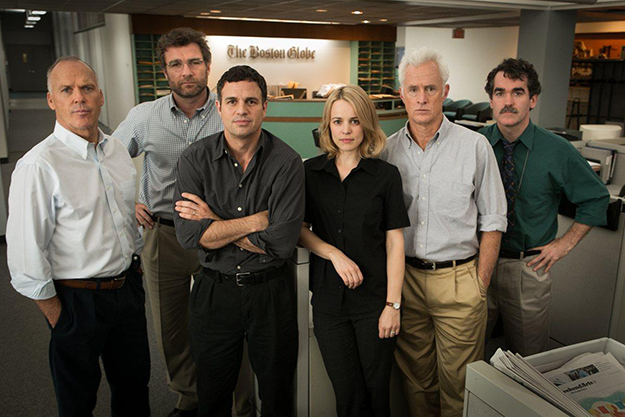
Spotlight combines the crackling pace and grip of a “procedural” with the illuminating textures of a first-rate social novel. This impassioned slice of American city life, layered with nuance, humor, and revelation, is the most penetrating movie yet from actor turned writer-director Tom McCarthy (The Station Agent, The Visitor, Win Win). The film is named for the “Spotlight” reporting team at The Boston Globe. McCarthy focuses his crisp intelligence on this investigative squad’s breakthrough work, in 2001, to expose child abuse and its cover-up in the Boston archdiocese. (The team began publishing its findings in January 2002.) Don’t mistake the film’s unvarnished, actor-centered visual style and its limpid narrative for What You See Is What You Get filmmaking. In the first eight minutes, McCarthy sets up undertows that pull you in and crosscurrents that engage your instincts and attention for the next two hours.
Spotlight is a “newspaper movie,” but aside from its street wit and sleeves-rolled-up energy, it shares little with the Five Star Final muckrakers and Front Page–style comedies of the Thirties and Forties or with the noir-ish drama of All the President’s Men. It’s more like a compact, adrenalized version of a Fred Wiseman documentary. As the reporters zero in on one institution—the Roman Catholic Church—McCarthy and his co-writer, Josh Singer (whose TV credits include The West Wing, Lie to Me, and Law & Order: Special Victims Unit), train their eyes and ears on another one—The Boston Globe.
The Spotlight editor and self-styled “player-coach,” Walter “Robby” Robinson (Michael Keaton), and his reporters, Mike Rezendes (Mark Ruffalo), Sacha Pfeiffer (Rachel McAdams), and Matt Carroll (Brian d’Arcy James), are immediately appealing and impressive characters. Our sympathy deepens as they comprehend the impact of these crimes and compile evidence that demonstrates how the Church bumps pedophilic priests—an astonishing six percent of the priesthood—from parish to parish instead of prosecuting and defrocking them.

Spotlight succeeds as both a tribute to the power of the press and a vivid exploration of a major daily as an evolving urban organism. The movie starts with The Boston Globe in transition. That’s not just because of the shrinking print industry and the burgeoning Internet (a touchingly dated AOL billboard looms over the parking lot). An out-of-town editor, Marty Baron (Liev Schreiber), is about to take charge of the newsroom. The staff is filled with Boston natives and long-timers, serving a readership that’s 53 percent Catholic. (The entire Spotlight team was raised Catholic, too.) Baron is a Jew from Florida who’d just served as executive editor for The Miami Herald.
Full disclosure: I may be the only film critic—I may be the only journalist—to be interviewed for a job by the Globe’s two legendary editors, Baron in 2002 and Tom Winship in 1974. I didn’t land the slot either time, and I don’t recall anything Baron said. But the interview with Winship has given me a special sense of what Baron himself was up against. Winship, a member of the Yankee Protestant establishment, looked quickly at my resume—I had just graduated from Harvard, and was freelancing in Boston. Then he said: “So, Mike: you’re basically a New York person?” When I asked my Boston Phoenix editor P.J. Corkery what Winship possibly could have meant by that, he laughed and said: “You’re Jewish.”
McCarthy played a slick/sleazy Baltimore Sun reporter on the flawed final season of The Wire. He must have picked up on the jolting flux of institutional power from working with David Simon, who has made it one of his great themes. As a director, McCarthy has a rare instinct for the ways top-down change sends tremors through an organization. Keaton’s patient, no-nonsense Robinson and John Slattery’s skeptical, sometimes blustery Ben Bradlee Jr. (the assistant managing editor in charge of investigations) are splendid at maintaining newsroom cred and dignity while sussing out the boss.
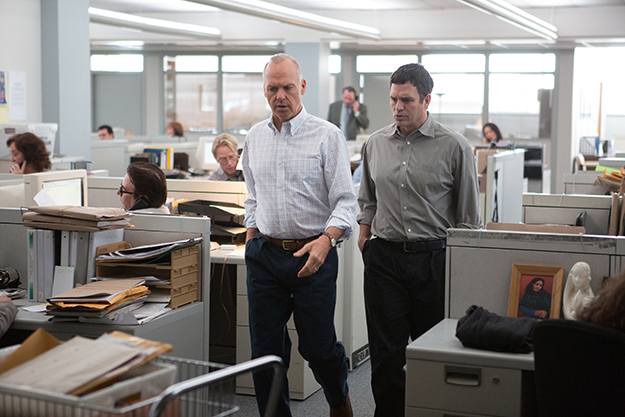
Baron invites a mere columnist, Eileen McNamara (Maureen Keiller), to his first editorial meeting—an unconventional move that rouses murmurs in the staff. (It’s wonderful how McCarthy keys into these small shivers of concern and paranoia.) McNamara has complained in print that a judge has sealed the documents in a civil suit against the archdiocese and a priest alleged to have molested scores of boys. Baron asks why the paper hasn’t challenged the judge’s order. Then he prods Robby and his Spotlight team to investigate how and why the Church circles the wagons around priests who victimize their young. At first they’re reluctant to believe that Boston’s abusive priests could rise to the number of 13. By the time they go to press they have confirmed 70.
In sound bites from the film’s electronic press kit, the actual Spotlight reporters give Baron credit for casting “fresh eyes” on the story and for finding a legal strategy to further their reporting. But the real subject of the movie is why fresh eyes were needed. The movie zeroes in with startling frankness on how easy it is to cave into a city’s dominant moral authority—in this case, the Roman Catholic Church. Baron must bear the brunt of the Church’s arrogance: Cardinal Law, who feels that a city’s institutions should cooperate with each other, presents Baron with a copy of the catechism as his welcome-to-Beantown present. Baron believes a newspaper serves its readers best when it stays independent. As Baron, Schreiber, a veracious actor, doesn’t overplay his shock or descend to aw-shucks humility when the reporters prove him right. He depicts Baron as a self-contained guy who’s got a sixth sense for journalistic truth: he intuits the hollowness of the Globe’s previous coverage of the Church’s sex-crime scandals.
Robinson is the newsman who endures an odyssey that shakes him to his journalistic core. As Robby, Keaton earns the praise he won for Birdman. In his subtlest, least mannered performance, Keaton portrays a news veteran who thinks he’s kept the Spotlight team on its toes, then is amazed to learn that he’s fallen into complacency. He’s marvelous as he becomes aware that he must maintain his distance from the old-goy network that runs from Boston College High right across Morrissey Boulevard to the Globe and then on into the country club, where Robby golfs with his old pal Jim Sullivan (Jamey Sheridan), a lawyer who keeps mum about his work for the archdiocese.
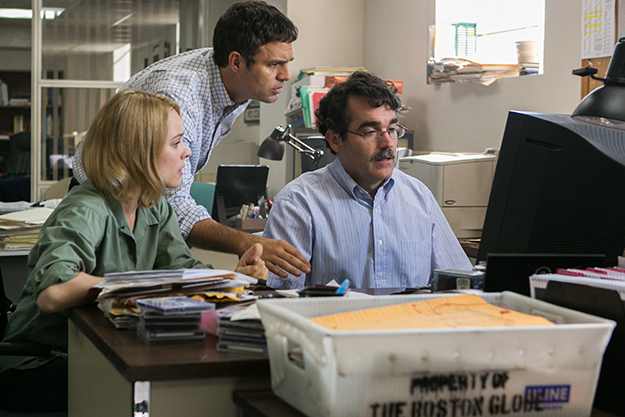
Spotlight is equally smart about the evidence needed to indict an entire system, not just individuals, and about journalistic quirks that can delay nailing down a story. Slattery’s headstrong, challenging Bradlee initially questions committing Spotlight to an abuse investigation. Early on, he semi-sneers at the mention of activist Phil Saviano: the trailblazing founder of the Survivors Network of Those Abused by Priests (a terrible name with the odd acronym SNAP). You worry that Bradlee has succumbed to a common, hardboiled reporter’s ailment: call it “victim fatigue.”
The movie is uncannily acute about the danger of busy journalists blowing off a source like Saviano because they think he’s too demanding or because they can’t corroborate his stories. Neal Huff is heartbreakingly articulate as Saviano, who realizes that his zealotry can put people off, but knows that his only shot to win justice for the raped and abused is to keep pushing, pushing, pushing.
McCarthy is just as shrewd at evaluating the practical morality of attorneys: white collars as well as clerical collars fall into patterns that perpetuate evil. McCarthy has cast his legal roles with actors who can sound psychological depths on the run. The film renders a mixed-to-negative verdict on the ambiguous character of high-powered lawyer Roderick MacLeish Jr. (Billy Crudup, in a silky-steely performance), whose negotiating on behalf of victims “led to an unholy alliance among Church officials, victims, and the attorneys” (in the words of the Spotlight team’s 2003 book, Betrayal: The Crisis in the Catholic Church). Because MacLeish nailed down settlements that required gag orders, “the archdiocese was able to conceal the crimes committed by its priests.” And while “victims were spared embarrassment . . . their attorneys collected their fees—generally a third of the settlement awards.” The movie, though, supports MacLeish when he blames the newspaper for not following up on a score of guilty priests he named for the Globe eight years earlier.
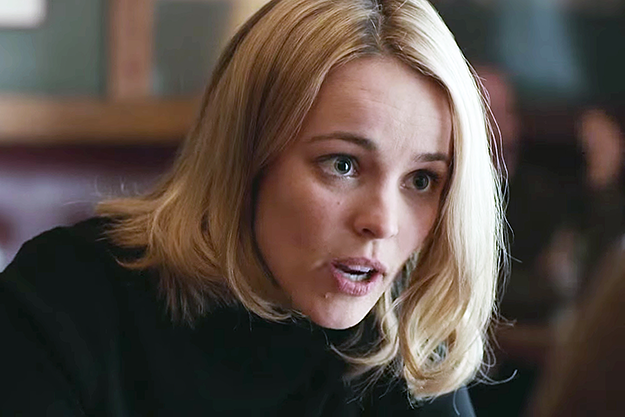
Stanley Tucci brings perfect crabby intensity to this slick lawyer’s opposite number, Mitch Garabedian, who comes up with the game-changing tactic of suing Cardinal Law and other church officials for knowing about priests’ sexual atrocities without doing anything to stop them. A scrappy self-made man of Armenian descent, Garabedian feels like an outsider. Rezendes, who’s of Portuguese descent, resists being part of any sentimental portrait of ethnic minorities banding together to bring Boston’s dark secrets to light. As Rezendes, Ruffalo creates a character whose rampaging curiosity bends him out of shape. This actor who has triumphed as the Hulk moves with a wiry, coiled energy and speaks with a passionate rapidity.
Remarkably, this film’s emphasis on journalism and the law intensifies rather than obscures the suffering of the victims who relive their agonies in hope of bringing predators to light. The performers who play these haunted souls, including Michael Cyril Creighton and Jimmy LeBlanc, set off deep and troubling resonances without flashbacks or emphatic music. They compose indelible word portraits of priests insinuating themselves as father figures to troubled children from broken homes, often in working-class neighborhoods where disobeying a priest is like balking at an order from God.
McCarthy fills his cast with players who are eloquent listeners. McAdams’s Pfeiffer, in particular, reassures the victims that the Spotlight team will not forget the case, despite snags and delays—especially after they’re assigned to cover the aftermath of 9/11. McAdams creates a warm, observant character out of tiny strokes. Knocking on doors in search of predators, she’s casually fearless. In the film’s most stunning moment, a priest opens his door and confesses forthwith to multiple acts of abuse. He thinks he’s proving his essential innocence when he says they never gave him any pleasure.
The Gotham Independent Film Awards recently created a special ensemble acting prize for Spotlight. “Ensemble” usually implies a group of performers collaborating to achieve a single effect. The cast of Spotlight does something different: it brings home the divergent details in the script that expand and open up the story. That’s why the movie feels so beautifully rounded. Pfeiffer is racked with sorrow because this story will change her devout grandmother’s impression of the Church. Rezendes gets tied in knots because he thought he’d always be able to return to the fold, but knowing what he knows, he can’t. The reporters repeatedly demand to know why so many Bostonians (not just Catholics or religious people) were prone to look away from child abuse. At the movie’s peak of candor, they ask that question of themselves.



